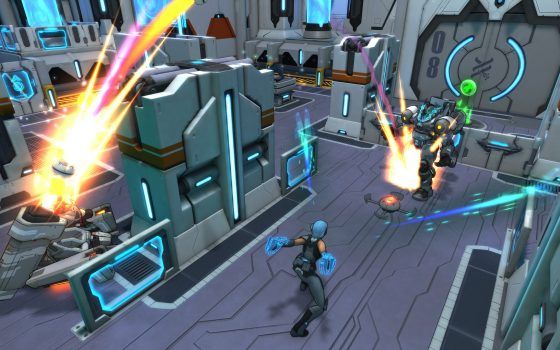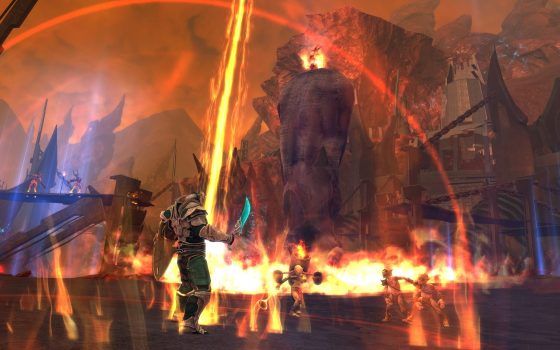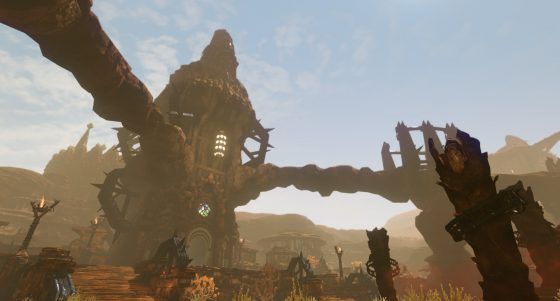Trion Worlds was in full force this year at PAX West 2016. In addition to showing off its newest title, Atlas Reactor, there were stations set up demonstrating upcoming additions to Trove, RIFT, and ArcheAge. While I did get a chance to look at the new updates coming to each game, I also had the opportunity to speak with Trion Worlds CEO Scott Hartsman to take a bigger look at the game studio.
Nick: Please introduce yourself and explain your role with Trion Worlds.
Scott: My name is Scott Hartsman and I got into making games about 25 years ago. I’ve only ever made online games because for me the excitement is about creating places where people can play together. I started out as a designer/customer service representative, became an engineer, became a producer and now I’m the CEO of Trion.
What’s your favorite part about working at Trion Worlds?
Being able to take part in creating the kind of place that I’ve always wanted to work when I was one of the people who was still making games. To me, so much of the joy of my previous jobs was all hands on. It was ‘I am a creating a thing, whether it’s a dungeon or gameplay system, that I know is going to make people who play our games happy. I’m going to create something that’s going to have a good effect in their life.’
So in this job, I don’t create stuff for games anymore, but I can help create a studio and an environment where people want to work at and where people can be treated well and be supported when they’re trying to make things that make other people’s lives better.
Do you miss being a developer and working hands-on with your games?
Every single day. I do. I really miss it, but at the same time it’s one of those miss it with fondness things because I get to see 10 times as many people making cooler stuff than I ever was.
With all of the other MMOs on the market these days, why should people play games created by Trion?
One of the things that I’m very proud about our games is they tend to pick a central theme that they’re good at and everything that they do furthers that theme around that game. Let’s take RIFT, our first game. It just had its 5th birthday and we just announced its third expansion.
RIFT is predominantly strong at the idea of players playing with other people. If you think about a co-op MMO, RIFT is like the perfect one of those. It’s the big events that bring players together. The instant adventure, the ability to sidekick up or mentor down. No matter what class you are, you have the ability to play all the combat roles. If that’s your thing then there is no better game than RIFT.
Let’s look at Trove. Trove is a voxel game. People look at voxel games and think sandbox. Trove’s very intent from the get go was to not be that type of game. There are plenty of voxel sandbox games, including one called Minecraft, which some number of people have tried. We are the opposite of that, we are adventure. Trove’s idea was to build an adventure and achievement MMO inside of a fully constructible and destructible world. If you want to play an adventure game where you can fully build and destroy worlds then Trove is the best game for that.
Atlas Reactor is incredibly unique. It is a very focused, PvP competitive experience that is about how fast you can think and not how fast you can click. It’s not how many times per second you’re clicking your mouse. It is ‘how are you outthinking your opponent?’
Really, our games are about the core thing they’re good at. If the core thing is for you then you should totally play the game.
You have a lot of games in development at once. Are your development teams separate for each game or is there any overlap?
We are one of the few studios that has a core team that always stays on the game, but then we have other people that float in and float out, which is how we’re able to do such big games with such a relatively modest team size. If you take a look at Trove, I believe there’s 17 people on the game team proper today, but there are over 50 people at Trion who contribute to Trove. We get a lot of shared knowledge that cycles around the company that way. We’re only in two locations that are only two time zones apart, which is not the worst thing ever.
Can you tell us anything exciting about your newest game Atlas Reactor?
Obviously, it’s in beta. Launch is not too far away for it and it’s tracking really well. We’re doing the first tournaments of our hosting year. We’ve already seen communities beginning to do their own paid tournaments, which is really badass. When you’re making a competitive game, you kind of worry that there won’t be an audience who shows up and is crazy passionate about it and becomes better than you. Boy, did we get a community that’s better than us.
We haven’t heard any plans for Defiance in quite some time. Is the game still being supported?
So, Defiance is an interesting one. It was originally an experiment in ‘can a game company IP go into a TV show, which can then feedback into a game?’ I wasn’t even at Trion at the time when that all happened. The first thing I did was I looked at that game and I tried to figure out how can it be bigger, how can it be better, and what were the challenges it ran into along the way?
The place that I came to on Defiance was that the team did a fantastic job of building a game against some very unwinnable scenarios. They were trying to make a great PvP game and the ideal PvE game at the same time as trying to be timed to a TV show launch date. TV show launch dates don’t move. They were really just boxed in. We’ve found that there is a dedicated core that plays the game and sticks with it, and there’s a core that checks back in every month or so. We’re sticking mostly to live updates. That seems to be the healthiest way to run that game.
Which of Trion’s titles have been the most successful?
It’s a three-way tie between RIFT, Trove, and ArcheAge. All three of them have been fantastic in their own unique ways. I’m very glad that we don’t have a single title that is the one title the whole company is relying on. We’ve managed to make this cycle of building financially successful games, which can then feedback and support the rest of the studio while we keep building more. I’m very proud of the fact that 100 percent of the money we make goes back into making new games.
Trion has a lot of variation in its games ranging from MMOs to turn-based strategy. What made you want to attempt different genres when your core games were succeeding?
We are very bottom up when it comes to game pitches at our company. We started the first time in 2012. It was how we got the idea for Trove. We open up the call for pitches within the entire company; we don’t care who you are. You can be a designer, a customer service person, an engineer, a localization translator, it doesn’t matter. Everybody gets to write a one-pager and we put them together.
Everyone in the company is able to read all these pitches. Then we take feedback on what are people excited about because we want to make games that get us excited. If you’re making games that are only supposed to be commercially successful, then you’ll never succeed doing that. You have to make stuff you care about.
The only thing that we care about is that it has to be an online game and people have to be able to play together. Those are the only things that we set in stone. We don’t want to be the company that makes the same game over and over again.
I really appreciate you taking the time to speak with me about all of Trion’s games today. Is there anything else you would like our readers to know?
We are a very much community driven game company. We want to make games that people want to play, and we want to be as good of a partner to our players as those who make our games. PAX is very special to me because we have made announcements here and we’ve done our first fan gatherings here. I just want to say thank you. That’s what PAX is for me. It’s time to come to a show, have fun and say ‘thanks.’


